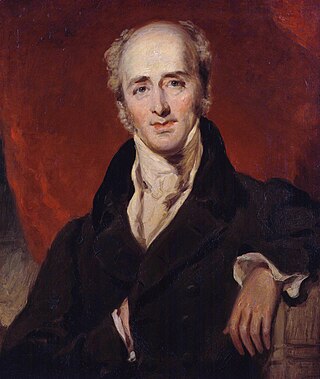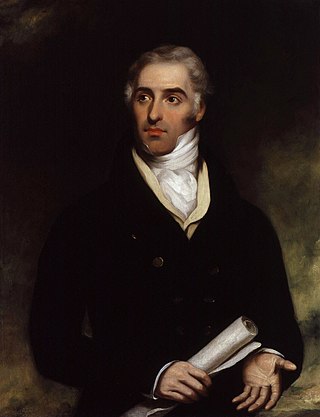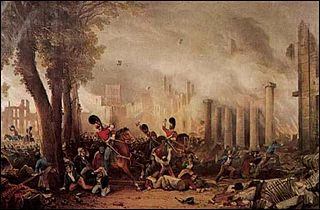
The Representation of the People Act 1832 was an Act of Parliament of the United Kingdom that introduced major changes to the electoral system of England and Wales. It reapportioned constituencies to address the unequal distribution of seats and expanded franchise by broadening and standardising the property qualifications to vote. Only qualifying men were able to vote; the Act introduced the first explicit statutory bar to women voting by defining a voter as a male person.

Edward Baines (1774–1848) was the editor and proprietor of the Leeds Mercury, politician, and the author of historical and geographic works of reference. On his death in 1848, the Leeds Intelligencer described his as "one who has earned for himself an indisputable title to be numbered among the notable men of Leeds".

The 1832 United Kingdom general election, the first after the Reform Act, saw the Whigs win an overall majority of 224 seats, with the Tories winning less than 30% of the vote.
The Radicals were a loose parliamentary political grouping in Great Britain and Ireland in the early to mid-19th century who drew on earlier ideas of radicalism and helped to transform the Whigs into the Liberal Party.

Thomas Attwood was a British banker, economist, political campaigner and Member of Parliament. He was the leading figure of the underconsumptionist Birmingham School of economists, and, as the founder of the Birmingham Political Union, the leading figure in the public campaign for the Great Reform Act of 1832.

Joseph Sturge was an English Quaker, abolitionist and activist. He founded the British and Foreign Anti-Slavery Society. He worked throughout his life in Radical political actions supporting pacifism, working-class rights, and the universal emancipation of slaves. In the late 1830s, he published two books about the apprenticeship system in Jamaica, which helped persuade the British Parliament to adopt an earlier full emancipation date. In Jamaica, Sturge also helped found Free Villages with the Baptists, to provide living quarters for freed slaves; one was named Sturge Town in his memory.
Owenism is the utopian socialist philosophy of 19th-century social reformer Robert Owen and his followers and successors, who are known as Owenites. Owenism aimed for radical reform of society and is considered a forerunner of the cooperative movement. The Owenite movement undertook several experiments in the establishment of utopian communities organized according to communitarian and cooperative principles. One of the best known of these efforts, which were largely unsuccessful, was the project at New Harmony, Indiana, which started in 1825 and was abandoned by 1829. Owenism is also closely associated with the development of the British trade union movement, and with the spread of the Mechanics' Institute movement.

William Lovett was a British activist and leader of the Chartist political movement. He was one of the leading London-based artisan radicals of his generation.

Henry Hetherington was an English printer, bookseller, publisher and newspaper proprietor who campaigned for social justice, a free press, universal suffrage and religious freethought. Together with his close associates, William Lovett, John Cleave and James Watson, he was a leading member of numerous co-operative and radical groups, including the Owenite British Association for the Promotion of Co-operative Knowledge, the National Union of the Working Classes and the London Working Men's Association. As proprietor of The Poor Man's Guardian he played a major role in the "War of the Unstamped" and was imprisoned three times for refusing to pay newspaper stamp duty. He was a leader of the "moral force" wing of the Chartist movement and a supporter of pro-democracy movements in other countries. His name is included on the Reformers' Memorial in Kensal Green Cemetery.

John Fielden was a British industrialist and Radical Member of Parliament for Oldham (1832–1847).

The Days of May was a period of significant social unrest and political tension in the United Kingdom in May 1832, after the Tories blocked the Third Reform Bill in the House of Lords, which aimed to extend parliamentary representation to the middle and working classes as well as the newly industrialised cities of the English Midlands and the North of England.
Joseph Parkes was an English political reformer.

Michael Thomas Sadler was a British Tory Member of Parliament (MP) whose Evangelical Anglicanism and prior experience as a Poor Law administrator in Leeds led him to oppose Malthusian theories of population and their use to decry state provision for the poor.
Joshua Scholefield was a British businessman and Radical politician. He was elected as one of Birmingham's two first members of parliament when the town was enfranchised as a result of the Reform Act 1832.

Richard Potter (1778–1842) was a radical non-conformist Liberal Party MP for Wigan, and a founding member of the Little Circle which was key in gaining the Reform Act 1832.
The Rotunda radicals, known at the time as Rotundists or Rotundanists, were a diverse group of social, political and religious radical reformers who gathered around the Blackfriars Rotunda, London, between 1830 and 1832, while it was under the management of Richard Carlile. During this period almost every well-known radical in London spoke there at meetings which were often rowdy. The Home Office regarded the Rotunda as a centre of violence, sedition and blasphemy, and regularly spied on its meetings.

The Reform movement in Upper Canada was a political movement in British North America in the mid-19th century.
The National Political Union was an organisation set up in October 1831, after the rejection of the Reform Bill by the House of Lords, to serve as a pressure group for parliamentary reform: “to support the King and his ministers against a small faction in accomplishing their great measure of Parliamentary Reform”.

The 1831 reform riots occurred after the Second Reform Bill was defeated in Parliament in October 1831. There were civil disturbances in London, Leicester, Yeovil, Sherborne, Exeter, Bath and Worcester and riots at Nottingham, Derby and Bristol. Targets included Nottingham Castle, home of the anti-reform Duke of Newcastle, other private houses and jails. In Bristol, three days of rioting followed the arrival in the city of the anti-reform judge Charles Wetherell; a significant portion of the city centre was burnt, £300,000 of damage inflicted and up to 250 casualties occurred.

The 1831 Bristol riots took place on 29–31 October 1831 and were part of the 1831 reform riots in England. The riots arose after the second Reform Bill was voted down in the House of Lords, stalling efforts at electoral reform. The arrival of the anti-reform judge Charles Wetherell in the city on 29 October led to a protest, which degenerated into a riot. The civic and military authorities were poorly focused and uncoordinated and lost control of the city. Order was restored on the third day by a combination of a posse comitatus of the city's middle-class citizens and military forces.
















